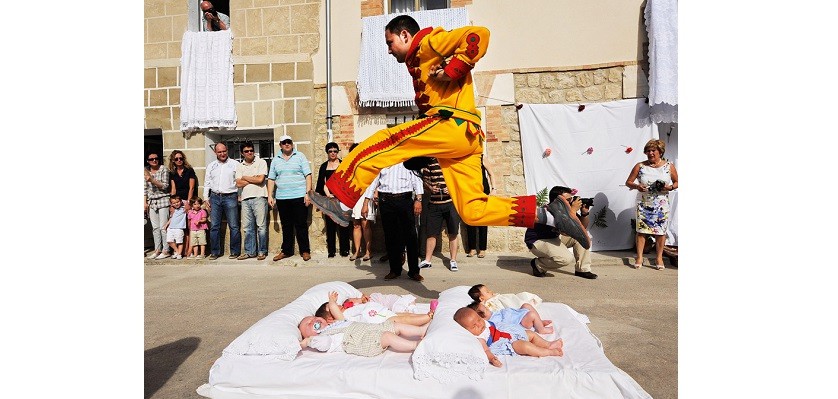Baby Jumping in Spain

Welcome to English Waves! I’m Sarah Heath with today’s program on traditions around the globe.
The tiny village of Castrillo de Murcia, is located in the province of Burgos in the north of Spain. The village itself looks straight out of medieval times with it’s creamy-coloured stone and a disproportionately large church. It is nestled unobtrusively among the rolling hillsides of this peaceful region but once a year it holds what must be one of the most unusual events in the world!
With a population of around 200 inhabitants, this unlikely village hosts a baby-jumping ceremony – an event likely to make many new parents gasp in collective horror. The tradition, which goes back to the 1620s, is the final event in a four-day festival of which the baby jumping part only last about half an hour on the very last day.
It is held annually on the Sunday following the Catholic Feast of Corpus Christi and in Spanish is called El Salto del Colacho, which in English translates to The Devil’s Jump. Babies born within the past twelve months are jumped over by a man dressed as the devil – the Colacho – which is meant to rid them of original sin and protect them from future illness or disease.
Originally a pagan tradition which pre-dates Christianity, and as with many such traditions, the Catholic Church found a way to incorporate it into the domain of the Christian religion. But not entirely with the full support of the Vatican: the local clergy has been urged to distance itself from the tradition wanting to re-emphasise that, according to the Catholic religion, original sin can only be removed through an official church baptism.
The occasion begins with the Brotherhood of Santísimo Sacramento de Minerva, who are the curators of the festival, leaving the church and parading through the village streets with the Colacho walking in the middle of them. Dressed in slightly intimidating black capes and hats, the Brotherhood watch on as the Colacho is taunted by the local children who hurl insults at him. The Colacho himself is dressed in a red and yellow medieval costume and mask and chases after the children, trying to whip them with the horsehair whip he carries.
Once this initial first stage has been completed – out come the babies! The Colacho heads to the church and upon exiting is once again greeted by taunts and insults from the local children. The story goes that the Colacho has lost a battle and is to be banished from the village in shame.
He then begins a second run around the village – this time jumping over the babies! As mothers try and settle their youngsters, some of whom aren’t overly enthusiastic at being lain on a mattress in the middle of the street, the bell starts ringing announcing the imminent arrival of the Colacho.
The babies are lain on mattresses, three or four on each, along the processionary route, and the Colacho runs and jumps over them thus cleansing them from sin and protecting their future health.
Dancers in traditional costumes dance along either side of the street as the Colacho continues onward, while flower girls sprinkle rose petals along the route and onto the babies. The procession also includes the local priest who blesses the babies after they have been jumped over.
Villagers hang white table cloths or sheets out of the first floor windows as decoration as the entire village participates in the celebration. The joy and community feel is palpable according to those who have seen it first hand. It is seen simply as a cultural tradition which all villagers, and some from nearby towns and villages, have passed from generation to generation. Still relatively unknown outside Spain, the celebration rarely sees crowds of over a few hundred, a number which peaks for the baby-jumping section at the end of the day.
Planning is of utmost importance and it has been known for some Colacho to practice jumping over pillows in preparation. It is encouraging to know that in the history of the festival, there has been no report of any Colacho inadvertently landing on a baby as he is hurdling over them!
The four days of celebration are wound up with a party including music and dancing. And what do the babies think of it all? Some look terrified at the noise and general commotion, some giggle away as though they understand the eccentricity of the whole thing and some……simply fall asleep while lying comfortably on the mattress under the Spanish sun!
Listen in to English Waves for the next program on world traditions.








COMMENTS